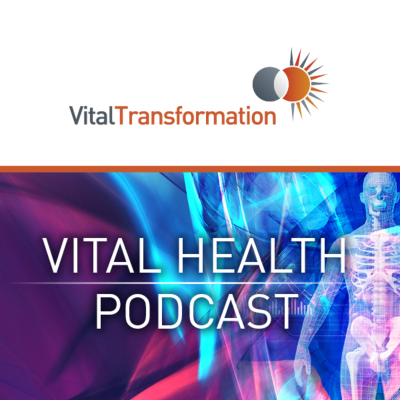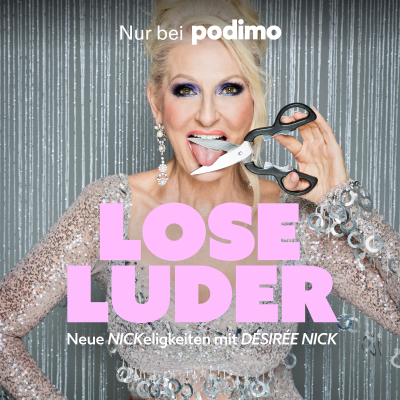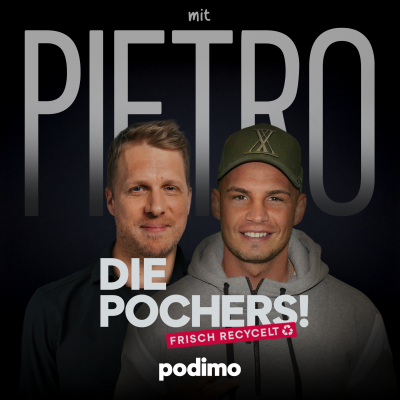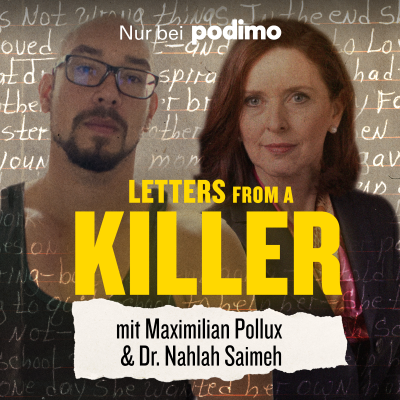
Vital Health Podcast
Englisch
Kostenlos bei Podimo
Kostenlos hören bei Podimo
Starte jetzt und verbinde dich mit deinen Lieblingspodcaster*innen
- Vertraut von über 1 Mio. deutschen Hörer*innen
- Über 1.000 lokale Podcasts und Shows – nur bei Podimo
- Keine Zahlung nötig
Mehr Vital Health Podcast
Duane Schulthess is the CEO of Vital Transformation, host and producer of Vital Health Podcast. Vital Transformation understands the implications of new medical procedures, technologies and regulations. We measure their impact upon treatment pathways and the biopharma innovation ecosystem in collaboration with health care professionals, researchers, and regulators. Through our web platform and client network, we are able to communicate our findings with international decision makers and stakeholders.
Alle Folgen
164 FolgenMark Rohrbaugh & Gwen O’Loughlin: Drug Patents, March-In Rights, and NIH Technology Transfer
In this episode of the Vital Health Podcast, host Duane Schulthess [https://www.linkedin.com/in/duane-schulthess-66ba39b7/] examines how NIH-funded research fits into the U.S. innovation and IP ecosystem, and why today’s political rhetoric about “government-developed drugs” often misses how commercialization actually happens. Featuring expert perspectives on NIH technology transfer and drug IP from: * Mark Rohrbaugh [https://www.linkedin.com/in/mark-l-rohrbaugh-9462a57/]: Former Director of Technology Transfer and Innovation Policy at the National Institutes of Health (NIH) [https://www.linkedin.com/company/national-institutes-of-health/], IP Consultant at Vital Transformation [https://www.linkedin.com/company/vital-transformation/] * Gwen O’Loughlin [https://www.linkedin.com/in/gwen-o-loughlin-8792003a9/]: Research Partner at Vital Transformation [https://www.linkedin.com/company/vital-transformation/] They discuss how the Bayh-Dole Act shaped university tech transfer, what government interest statements do - and do not - tell you about a drug’s origins, why “march-in rights” were designed as a development backstop rather than a pricing tool, and how proposals to redirect royalties or restrict NIH-industry collaboration could disrupt the pipeline that turns early science into real-world therapies. Key Topics: * NIH’s Role in the Innovation Pipeline: How NIH funding de-risks foundational science, how industry and universities translate it, and why “NIH developed all drugs” is a misleading simplification. * Government Interest Statements: What the statement signals, why it is inconsistently surfaced across patents, and what large-scale reviews suggest about how often it appears in drug-related patent portfolios. * March-In Rights and Policy Misuse: The original purpose (anti-shelving and public health needs), how petitions are evaluated in practice, and why pricing-based efforts have not succeeded. * Mechanisms Supporting Translation: Why CRADAs and licensing structures matter for bringing technologies to market and for enabling NIH research with proprietary industry tools. * Forward Outlook: How royalty diversion or restricting partnerships could weaken incentives and capacity, and why the guests anticipate near-term disruption with longer-term consequences. Opinions expressed are those of the speakers. See omnystudio.com/listener [https://omnystudio.com/listener] for privacy information.
Oriana Ciani & Denis Lacombe: Overall Survival and Surrogate Endpoints in Early Oncology Approvals
In this episode of the Vital Health Podcast, host Duane Schulthess [https://www.linkedin.com/in/duane-schulthess-66ba39b7/] speaks with two experts on evidence standards for early oncology access at ISPOR Europe 2025 in Glasgow, Scotland: * Oriana Ciani: [https://www.linkedin.com/in/oriana-ciani-bb029a8/?originalSubdomain=it] Associate Professor of Practice at SDA Bocconi School of Management [https://www.linkedin.com/school/sda-bocconi-school-of-management/] * Denis Lacombe: [https://www.linkedin.com/in/denislacombe/?originalSubdomain=be] Director General at EORTC [https://www.linkedin.com/company/eortc/] They discuss why accelerated pathways are used in oncology, what becomes feasible and risky when patient populations are small, how surrogate endpoints such as progression-free survival can differ from overall survival and quality of life, and why post-authorization evidence generation and treatment optimization shape whether early access translates into sustained patient benefit. Key Topics: * Accelerated Approvals: Unmet need concepts, regulatory pathways, and access pressure in oncology. * Rare Trial Design: Small populations, randomization feasibility, comparator constraints. * Surrogate Endpoints: Progression-free survival, early-stage endpoints, evidence needed to validate surrogates. * HTA Variation: Differing national standards, uncertainty handling, reimbursement timing effects. * Treatment Optimization: Post-authorization evidence gaps, dose and duration questions, aligning evidence needs earlier. Opinions expressed are those of the speakers. This podcast was supported by Merck Sharp & Dohme as part of the APACE project, in collaboration with GlaxoSmithKline and AstraZeneca. See omnystudio.com/listener [https://omnystudio.com/listener] for privacy information.
Anja Schiel & Nicholas Hedberg: Accelerated Approvals, Evidence Gaps, and Reimbursement Risk
In this episode of the Vital Health Podcast, host Duane Schulthess [https://www.linkedin.com/in/duane-schulthess-66ba39b7/] speaks with two experts on reimbursement-facing evidence questions for accelerated oncology approvals at ISPOR Europe 2025 in Glasgow, Scotland: * Anja Schiel: [https://www.linkedin.com/in/anjaschiel/?originalSubdomain=no] Senior Advisor, Norwegian Medical Products Agency [https://www.linkedin.com/company/direktoratetformedisinskeprodukter/] * Niklas Hedberg: [https://www.linkedin.com/in/niklas-hedberg-3947231/] Chief Pharmacist at The Dental and Pharmaceutical Benefits Agency (TLV) [https://www.linkedin.com/company/tlv-the-dental-and-pharmaceutical-benefits-agency/] They unpack why results that are strong inside a clinical trial can be harder to apply to real-world national populations, how decision-makers weigh patient-relevant outcomes and uncertainty at the time of access decisions, and what risk management can look like when early approvals require follow-up evidence and potential reassessment. Key Topics: * Trial Generalizability: Selection in trials, real-world populations, and health system variation. * Reimbursement Evidence: Patient-relevant outcomes, absolute versus comparative benefit, small-sample challenges. * Conditional Approval: Evidence at authorization, reassessment expectations, withdrawal, and restriction risk. * Risk Tradeoffs: Approving too early versus delaying access, urgency in progressive disease, and equity constraints. * Adaptive Follow-up: Real-world evidence plans, managed entry approaches, learning while treating. Opinions expressed are those of the speakers. This podcast was supported by Merck Sharp & Dohme as part of the APACE project, in collaboration with GlaxoSmithKline and AstraZeneca. See omnystudio.com/listener [https://omnystudio.com/listener] for privacy information.
Kathleen Grieve, Martina Garau, & Bettina Ryll: Accelerating Patient Access To Cancer Medicines In Europe
In this episode of the Vital Health Podcast, host Duane Schulthess [https://www.linkedin.com/in/duane-schulthess-66ba39b7/] speaks with three experts on accelerated patient access to cancer medicines at ISPOR Europe 2025 in Glasgow, Scotland: * Martina Garau: [https://www.linkedin.com/in/martina-garau-806b0b2a/?originalSubdomain=uk] Director at Office of Health Economics [https://www.linkedin.com/company/office-of-health-economics/] * Bettina Ryll: [https://www.linkedin.com/in/bettinaryll/?originalSubdomain=se] Founder at MPNEurope [https://www.linkedin.com/company/mpneurope/] * Kathleen Grieve: [https://www.linkedin.com/in/kathleen-grieve-7453a69/?originalSubdomain=be] Director - European Public Policy, Access, Pricing and Affordability Lead at MSD Europe [https://www.linkedin.com/company/msdeurope/] They explore why accelerated access matters when evidence is still emerging, how the APACE framework proposes a structured path from eligibility through reassessment, what it could take to reduce fragmentation across national HTA and reimbursement processes, and why pragmatic pilots and agreed data expectations are central to learning while treating. Key Topics: * Accelerated Access: Urgency in life-threatening cancer, uneven uptake across countries, and patient time sensitivity. * APACE Framework: Eligibility screening, initial assessment, temporary reimbursement, reassessment, and exit decisions. * National Alignment: EU-level assessment versus country decisions, shared principles, local implementation limits. * Evidence Uncertainty: Early evidence tradeoffs, real-world data needs, and affordability pressure under uncertainty. * Getting Started: Pilot use cases, coalition of the willing, dynamic evidence expectations over time. Opinions expressed are those of the speakers. This podcast was supported by Merck Sharp & Dohme as part of the APACE project, in collaboration with GlaxoSmithKline and AstraZeneca. See omnystudio.com/listener [https://omnystudio.com/listener] for privacy information.
2025 US Policy Highlights - Inflation Reduction Act (IRA) Part 2
In this special 2025 U.S. Policy Highlights edition of the Vital Health Podcast, we look back at our most important discussions on the Inflation Reduction Act (IRA) and its ripple effects across drug development, Medicare, and patient access. Over the past year, the biopharma industry and the broader healthcare system have undergone a period of rapid change as new rules surrounding drug pricing reshape how therapies are developed, financed, and delivered. In a landscape where policies are still being interpreted and adjusted, and where the long-term impact on innovation and access is far from certain, this episode serves as a year-end guide to what has changed and how to think about the road ahead. Throughout 2025, we paired our research with a series of podcast episodes where host Duane Schulthess sat down with industry leaders. In this highlights episode, we revisit several of those conversations: * Donna Cryer: Advocacy, Drug Incentives & Research Crisis * Barbara McAneny, Rafael Fonseca, and Steve Potts: Protecting Patients Amid the IRA * Kirsten Axelsen: Part D Shift, IRA Penalties, and Access Risks Key Topics: * Pill Penalty: How the shorter negotiation window for small molecule medicines relative to biologics is changing the calculus for pursuing oral therapies in areas such as cardiovascular disease, neurodegeneration, and other chronic conditions. * Part D Redesign: Why moving more liability to plans is driving new premium and coverage tradeoffs, influencing which products stay on formularies, and raising questions about access in rural and underserved areas. * Early Stage Investment: What our data suggest about the pullback in trial starts and funding for projects most exposed to IRA mechanics, and how that is influencing company formation, licensing strategies, and pipeline mix. * PBMs, Vertical Integration, & Biosimilars: How consolidated intermediaries and payer-owned biosimilar strategies interact with IRA price setting, rebate flows, and the outlook for generic and biosimilar competition. * Patient Advocacy & Real World Impact: What older adults, cancer patients, and rare disease communities are already experiencing as coverage rules change, cost-sharing is redesigned, and uncertainty grows around long-term treatment availability. * Policy Paths Forward: Ideas from our guests for adjusting timelines, refining negotiation rules, and protecting incentives for follow-on and orphan indications while still improving affordability for patients. Opinions expressed are those of the speakers. See omnystudio.com/listener [https://omnystudio.com/listener] for privacy information.















































